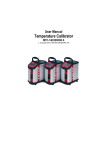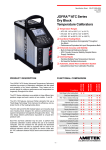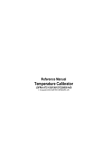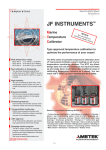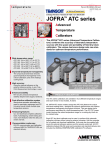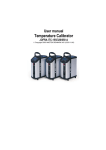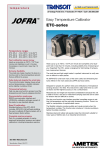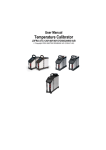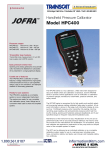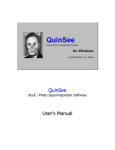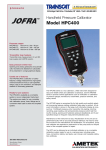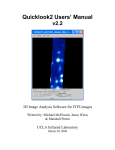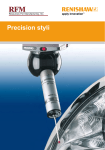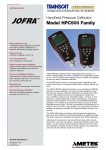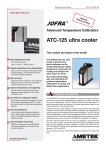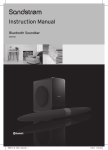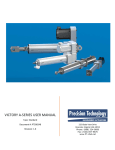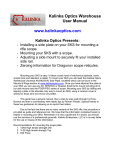Download Jofra ETC User Manual
Transcript
User manual Temperature Calibrator JOFRA ETC-125 A / 400 A / 400 R Copyright 2005 AMETEK DENMARK A/S (123943-UK) FIG. 1 2 1 ON 115 V 5 3 29-09-2005 4 FIG. 2 ET C CALIBRATION INSTRUMENTS C F C F min AUTO STEP ESC MENU 4 5 3 2 1 6 7 C F 14 C F min 13 12 29-09-2005 11 8 9 10 FIG. 3 ESC MENU °C °C AUTO STEP ESC MENU 29-09-2005 FIG. 4 AUTO STEP AUTO STEP 29-09-2005 FIG. 5 ESC MENU ESC MENU ESC MENU ESC MENU ESC MENU 29-09-2005 ESC MENU ESC MENU 29-09-2005 List of contents 1.0 Introduction..................................................................... 2 2.0 Safety instructions ......................................................... 3 3.0 Operating the calibrator ................................................. 6 3.1 3.2 3.3 3.4 3.5 3.6 3.7 3.8 Before use ...........................................................................6 Keyboard .............................................................................8 Display.................................................................................8 Connections ........................................................................9 Calibrator functions - overview ............................................9 Selecting the set-temperature .............................................9 AUTO STEP ......................................................................10 MENU................................................................................11 4.0 After use ........................................................................ 12 123943 03 1 1.0 Introduction ETC-calibrators are temperature calibrators designed to calibrate temperature sensors. Read this manual carefully before using the instrument and make sure that all safety instructions and warnings are observed. 2 123943 03 2.0 Safety instructions Read this manual carefully before using the instrument! In order to avoid any personal injuries and/or damage to the instrument all safety instructions and warnings must be observed. Disposal – WEEE Directive These calibrators contain Electrical and Electronic circuits and must be recycled or disposed of properly (in accordance with the WEEE Directive 2002/96/EC). Warning…… About the use: • The calibrator must not be used for any purposes other than those described in this manual. • The calibrator has been designed for interior use only and should not be used in hazardous areas, where vapour or gas leaks, etc. may constitute a danger of explosion. The calibrator must be kept free within an area of 20 cm on all sides and 1 metre above the calibrator. Never use heat transfer fluids such as silicone, oil, paste, etc. These fluids may penetrate the calibrator and cause damage or create poisonous fumes. • • 123943 03 3 About the insertion tubes: • Never leave hot insertion tubes which have been removed from the calibrator unsupervised – they may constitute a fire hazard. Caution – Hot surface • • 4 Do not touch the well, the insertion tube or the grid plate, as the calibrator is heating up / has been heated up – they may be very hot Do not touch the tip of the sensor when it is removed from the insertion tube/well – it may be very hot. 123943 03 Caution… About the use: • Do not use the instrument if the ventilator is out of order. About the well, insertion tube and grid plate: • • • The well and the insertion tube must be clean before use. The insertion tube must never be forced into the well. The well could be damaged as a result, and the insertion tube may get stuck. The insertion tube must always be removed from the calibrator after use. The humidity in the air may cause verdigris on the insertion tube inside the instrument. There is a risk that the insertion tube may be stuck if this is allowed to happen. Note… The product liability only applies if the instrument is subject to a manufacturing defect. This liability becomes void if the user fails to follow the instructions set out in this manual or uses unauthorised spare parts. 123943 03 5 3.0 Operating the calibrator 3.1 Before use Warning • The calibrator must not be used for any purposes other than those described in this manual. • The calibrator is designed for interior use only and should not be used in risk-prone areas, where vapour or gas leaks, etc. may constitute an explosives hazard. • Never use heat transfer fluids such as silicone, oil, paste, etc. These fluids may penetrate the calibrator and cause damage or create poisonous fumes. • The calibrator must be kept clear within an area of 20 cm on all sides and 1 metre above the calibrator. Caution – Hot surface Do not touch the well, the insertion tube or the grid plate, as the calibrator is heating up / has been heated up – they may be very hot. 6 123943 03 Follow the instructions below before using the calibrator (cf. Fig. 1): 1. Place the calibrator on an even horizontal surface away from all draughts. Caution… Do not use the instrument if the ventilator is out of order. Ensure a free supply of air to the ventilator (pos. 5). 2. 3. 4. Check that the voltage shown on the label above the power control switch is identical to the mains voltage (ETC-400 only). If not, the instrument should be returned to Ametek Denmark A/S or the distributor for replacement. Plug in the cable below (pos. 3) the power control switch (pos. 4) and check that the earth connection is present. The selected insertion tube is inserted into the calibrator (ETC-125 A only). Caution… • • The well and the insertion tube must be clean before use. The insertion tube must never be forced into the well. The well could be damaged as a result, and the insertion tube may get stuck. 5. Place the sensor (pos. 1, Fig. 1). 123943 03 7 3.2 Keyboard The keys on the keyboard activate the following functions (cf. Fig. 2): POS Description ENTER button used to accept chosen options. UP ARROW button used to adjust temperature values (value increases) and to select menu options. DOWN ARROW button used to adjust temperature values (value decreases) and to select menu options. ESC/MENU button used to escape or to activate the menu system (hold button down for min. 2 seconds). AUTO STEP button used to activate AUTO STEP. The function is used to switch between a series of settemperatures automatically. 3.3 Display The various segments of the display are used to indicate the following (cf. Fig. 2): POS Description Used to display Read-temperature and parameters in the menu system. Celsius temperature unit for top display. Fahrenheit temperature unit for top display. Fahrenheit temperature unit for bottom display. Celsius temperature unit for bottom display. Minute time unit for bottom display. Used to display set-temperature, time-until-stable and parameter values in the menu system. 8 123943 03 AUTO STEP symbol used to indicate that the function is active (symbol flashes repeatedly). Check mark displayed when the calibrator is stable. 3.4 Connections The instrument is designed for the following connections (cf. Fig. 1): POS Description Connection of RS232 cable 3.5 Calibrator functions - overview The instrument’s functions are divided into hierarchical groups. See the key diagram in Fig. 3. 3.6 Selecting the set-temperature Press or . The current set-temperature flashes (the starting point is the last chosen set-temperature even if the instrument has been turned off). Press Press or to select the required temperature. to accept the change or ESC MENU to cancel and return to the previous value. The calibrator will now work towards the new set-temperature. 123943 03 9 3.7 AUTO STEP The AUTO STEP function (cf. Fig. 4) is used to step automatically between a range of different set-temperatures. AUTO Press STEP . The instrument displays the number of settemperature . Press or to select the required number of steps. Press to accept your selection. The first set-temperature will flash. Press or to select the required temperature. Press to accept your selection. The next set- temperature will flash. This process will be repeated until the last value has been accepted. The extra for which you wish the calibrator to remain at every step will flash. Press or to set the required number of minutes. Press to accept your selection. The function will be activated. Press or 10 ESC MENU after the last set-temperature to end the function to leave the function at any time. 123943 03 3.8 MENU The MENU function (cf. Fig. 5) is used to modify the SETUP parameters. ESC Hold down MENU for approx. 2 seconds. The word will appear on the display. Press . The first SETUP parameter will be displayed. Press or to toggle between the SETUP parameters: : Temperature unit °C or °F. : The highest permissible temperature for the calibrator. : : Press Extra time which must elapse once the well is stable before the check mark symbol is displayed. Temperature resolution of 0 or 1 decimal. to select the SETUP parameter you wish to change. The current value will flash. Press or to select the required value. Press to accept your selection or ESC MENU to cancel and return to the previous value. Once you have changed all SETUP parameters as required, cancel the function by pressing 123943 03 ESC MENU twice. 11 4.0 After use Caution – Hot surface • • Do not touch the well, the insertion tube or the grid plate - they may be very hot. Do not touch the tip of the sensor when it is removed from the insertion tube/well – it may be very hot. ETC-125 A only. Warning…… • Never leave hot insertion tubes which have been removed from the calibrator unsupervised – they may constitute a fire hazard. Caution… • The insertion tube must always be removed from the calibrator after use. The humidity in the air may cause verdigris to form on the insertion tube inside the instrument. There is a risk that the insertion tube may become stuck if this is allowed to happen. The following routine must be observed before the insertion tube is removed and the instrument turned off (cf. Fig. 1) : 1. 2. 3. 4. 12 If the calibrator has been heated up to temperatures above 100°C/212°F, you must wait until the instrument reaches a temperature below 100°C/212°F before you switch it off. If the calibrator has reached a temperature below 0°C/32°F, it should be heated momentarily to a temperature of 50°C/122°F. Turn off the calibrator using the power control switch (pos. 4). Remove the insertion tube from the calibrator using the tool supplied with the instrument. 123943 03 Reference manual Temperature Calibrator JOFRA ETC-125 A / 400 A / 400 R Copyright 2005 AMETEK DENMARK A/S (123943-UK) List of contents 1.0 2.0 3.0 Introduction ..............................................................................4 Safety instructions ...................................................................6 Setting up the calibrator ..........................................................8 3.1 3.2 3.3 3.4 4.0 Receipt of the calibrator................................................................ 8 Preparing the calibrator .............................................................. 10 Choice of insertion tube / correct bore in well. .......................... 11 Inserting the sensor .................................................................... 13 Operating the calibrator.........................................................14 4.1 4.2 4.3 4.4 4.5 Keyboard, display and connections............................................ 14 Starting the calibrator.................................................................. 17 Selecting the set-temperature .................................................... 17 Using the AUTO STEP ............................................................... 19 Using the MENU ......................................................................... 22 4.5.1 Adjusting the temperature unit ....................................... 23 4.5.2 Adjusting the max-temperature ...................................... 24 4.5.3 Adjusting the extra stability time..................................... 24 4.5.4 Adjusting the temperature resolution ............................. 25 4.6 Calibrating IR-thermometers (ETC-400 R only) ......................... 26 4.7 Simulation/training ...................................................................... 29 5.0 6.0 7.0 8.0 Storing and transporting the calibrator ...............................30 Errors.......................................................................................33 Returning the calibrator for service .....................................35 Maintenance............................................................................37 8.1 Cleaning...................................................................................... 37 8.2 Adjusting and calibrating the instrument..................................... 38 8.2.1 Adjusting the calibration date ......................................... 40 8.2.2 Calibrating/adjusting the instrument............................... 41 8.2.3 Calibrating/adjusting the ETC-400 R.............................. 45 9.0 Technical specifications ........................................................46 10.0 List of accessories .................................................................52 123943 03 3 1.0 Introduction Congratulations on your new Ametek Jofra ETC Calibrator! With the Ametek Jofra calibrator, you have chosen an extremely effective instrument which we hope will live up to all your expectations. Over the past many years, we have acquired extensive knowledge of industrial temperature calibration. This expertise is reflected in our products which are all designed for daily use in an industrial environment. Please note that we would be very interested in hearing from you if you have any ideas or suggestions for changes to our products. This reference manual applies to the following instruments: • • • Jofra ETC-125 A Jofra ETC-400 A Jofra ETC-400 R ISO-9001 certified Ametek Denmark A/S was awarded the ISO-9001 certificate in September 1994 by BVQI - Bureau Veritas Quality International. 4 123943 03 CE-label Your new calibrator bears the CE label and conforms to the EMC directive and the Lowvoltage Directive. Technical assistance Please contact the dealer from whom you acquired the instrument if you require technical assistance. Guarantee According to current terms of sale and delivery. This guarantee only covers defects in manufacture and becomes void if the instrument has been subject to unauthorised intervention and/or misuse. 123943 03 5 2.0 Safety instructions Read this manual carefully before using the instrument! Please follow the instructions and procedures described in this manual. They are designed to allow you to get the most out of your calibrator and avoid any personal injuries and/or damage to the instrument. Warning • • • • • • 6 The calibrator must not be used for any purposes other than those described in this manual. The calibrator is designed for interior use only and should not be used in risk-prone areas, where vapour or gas leaks, etc. may constitute an explosives hazard. Neither should the calibrator be operated in an excessively dusty or dirty environment. Avoid knocking, bumping or dropping the instrument. This can cause permanent damage to the instrument and loss of accuracy. Do not operate this instrument without a properly grounded power cord. Do not use this instrument for any application other than calibration work. The calibration instruments should only be used by TRAINED PERSONNEL. 123943 03 Caution – Hot surface This symbol is engraved in the well of the ETC-400 A and in the grid plate of the ETC-125 A / 400 R. • Do not touch the well, the insertion tube, the grid plate or the target unit – they may be very hot. Note… The product liability only applies if the instrument is subject to a manufacturing defect. This liability becomes void if the user fails to follow the maintenance instructions set out in this manual or uses unauthorised spare parts. 123943 03 7 3.0 Setting up the calibrator 3.1 Receipt of the calibrator When you receive the instrument… • Carefully unpack and check the calibrator and the accessories. • Check the parts off against the list shown below. If any of the parts are missing or damaged, please contact the dealer who sold the calibrator. You should receive: • 1 calibrator • 1 mains power cable • 1 insertion tube (ETC-125 A only) • 1 tool for insertion tube (ETC-125 A only) Calibration Certificate CALIBRA TION INSTRUMENTS Calibration Equipment xxxxxxxxxxxx Calibration Traceability • 1 traceable calibration certificate Calibration Procedure xxxxxxxxxxxx xxxxxxxxxxxx xxxxxxxxxxxx xxxxxxxxxxxx Calibration Conditions xxxxxxxxxxxx xxxxxxxxxxxx xxxxxxxxxxxx Calibration Results xxxx 8 xxxx xxxx xxxx xxxxxx xxxxxx xxxxxx xxxxxx xxxxxx xxxxxx xxxxxx xxxxxx xxxxxx xxxxxx xxxxxx xxxxxx xxxxxx xxxxxx xxxxxx xxxxxx xxxxxx xxxxxx xxxxxx xxxxxx xxxxxx xxxx xxxxxx xxxx xxxxxx xxxxxx 123943 03 • 1 user- and reference manual User/reference manual • 1 RS 232 serial cable • 1 shoulder strap • 1 CD-ROM containing the software package “JOFRACAL” • 1 CD-ROM containing JOFRA IR-LAB calibration software (ETC-400 R only) • 1 correction table for emissivity (ETC-400 R only) When reordering, please specify the parts number found in the list of accessories, section 10.0. 123943 03 9 3.2 Preparing the calibrator Warning • The calibrator must not be used in areas prone to explosives hazards. • The calibrator must be kept clear within an area of 20 cm on all sides and 1 metre above the calibrator. Note… The instrument must not be exposed to draughts. Especially the temperature of the target unit surface on the ETC-400 R might be affected by this. 6 115 V 5 4 3 1 2 Fig. 1 10 123943 03 When setting up the calibrator, you must…(see fig. 1) Place the calibrator on an even horizontal surface in the spot you intend to use it. Caution… Do not use the instrument if the ventilator is out of order. Ensure a free supply of air to the ventilator. Check that the voltage shown on the label above the power control switch is identical to the mains voltage (ETC-400 A/R only). If not, the instrument should be returned to Ametek Denmark A/S or the distributor for replacement. Check that the earth connection for the instrument is present and attach the cable. Select an insertion tube with the correct bore diameter and place it in the largest bore of the instrument (ETC-125 A only) or use one of the bores in the well that best suits your needs. See section 3.3 for information on how to select the insertion tube/ correct bore in the well. The calibrator is now ready for use. Section 3.3 and 3.4 are for ETC-125 / 400 A only 3.3 Choice of insertion tube / correct bore in well. Insertion tubes are only available for the ETC-125 A. An insertion tube is selected on the basis of the diameter of the sensor to be calibrated. You may choose between an 8 mm / 5/16 inch insertion tube, an 3/8 inch insertion tube or alternatively, you may order an undrilled insertion tube and drill the required hole yourself. The finished dimension should be as follows: • Sensor diameter +0.2 +0.05/-0 mm. 123943 03 11 A bore is selected on the basis of the diameter of the sensor to be calibrated. The sensor can now be inserted directly into the bore of the well. See Fig. 2 for various design combinations. The various design combinations to choose from. 2mm 3mm 4mm 4mm 5/32 in. 3/16 in. 6 mm 1/4 in. Metric - ETC-400 A Imperial - ETC-400 A 1/4 in. 3/8 in. 1/8 in. 1/16 in. 8mm 5/16 in. 6mm 1/4 in. 1/16 in. 4mm 5/32 in. 12.5mm 1/2 in. 1/8 in. 3/16 in. Imperial - ETC-400 A ETC-125 A Fig. 2 12 123943 03 3.4 Inserting the sensor Before inserting the sensor and switching on the calibrator, please note the following important warning: Warning • Never use heat transfer fluids such as silicone, oil, paste, etc. These fluids may penetrate the calibrator and cause damage or create poisonous fumes. Insert the sensor as shown in Fig. 1, pos. 6. Caution… • • • • • 123943 03 The well and the insertion tube must be clean before use. Scratches and other damage to the insertion tube should be avoided by storing the insertion tube carefully when not in use. The insertion tube must never be forced into the well. The well could be damaged as a result, and the insertion tube may get stuck. Do not touch the well, the insertion tube or the grid plate as the calibrator is heating up – they may be very hot. Do not touch the tip of the sensor when it is removed from the insertion tube/well – it may be very hot. 13 4.0 Operating the calibrator 4.1 Keyboard, display and connections Keyboard ET C CALIBRATION INSTRUMENTS C F 1 C F min AUTO STEP ESC MENU 2 3 4 5 6 Fig. 3 Pos. Description LCD. AUTO STEP button used to activate AUTO STEP. The function is used to switch between a series of settemperatures automatically. ESC/MENU button used as Escape key or to activate the menu system (hold button down for min. 2 seconds). DOWN ARROW button used to adjust temperature values (value decreases) and to select menu options. UP ARROW button used to adjust temperature values (value increases) and to select menu options. ENTER button used to accept chosen options. 14 123943 03 Display 9 8 C F 1 6 C F min 2 3 7 5 4 Fig. 4 Pos. Description CHECKMARK displayed when the calibrator is stable. AUTO STEP symbol used to indicate that the function is active (symbol flashes repeatedly). Used to display set-temperatures, time-until-stable and parameter values in the menu system. Minute time unit for bottom display. Celsius temperature unit for bottom display. Fahrenheit temperature unit for bottom display. Fahrenheit temperature unit for top display. Celsius temperature unit for top display. Used to display Read-temperature and parameters in the menu system. 123943 03 15 Connections All connections are located on the back of the instrument. 2 3 115 V 1 Fig. 5 Pos. Description Power control switch with connection for cable and on/off switch. Connection for RS232 cable. Voltage label. It is very important that the voltage shown on the label is identical to the mains voltage. 16 123943 03 4.2 Starting the calibrator Switch the calibrator on using the power control switch (Fig. 5, pos. 1). The instrument is initialised and the last calibration date is displayed: The calibration date will be displayed for approx. 2 seconds. The initialisation process has been completed and the calibrator is ready for use. All settings are stored when the calibrator is switched off. When the instrument is switched back on again, the status will be the same as when it was switched off. 4.3 Selecting the set-temperature Press to adjust the set-temperature. or The current selection flashes in the bottom display: °C °C The starting point is the last chosen set-temperature (even if the instrument has been switched off). Press to accept the change or ESC MENU to cancel. The calibrator will now heat up/cool down. 123943 03 17 The top display continuously shows the read-temperature. The bottom display shows either the set-temperature or the estimated time in whole minutes until the calibrator will be stable: °C min When the calibrator is stable the display will show the checkmark symbol. The instrument will emit an audible alarm and the estimated time until stable will be replaced by the set-temperature: °C °C 18 123943 03 4.4 Using the AUTO STEP AUTO STEP is used to step automatically between a range of different calibration temperatures. This is useful when calibrating sensors in places which are hard to reach, and when calibrating sensors for which the output is displayed in a different location. The function can be illustrated using the following example: Fig. 6 Press AUTO STEP . symbol for AUTO STEP flashes to indicate that The the function is active. The function can be cancelled at any time by pressing 123943 03 ESC MENU 19 Press or to select the required number of steps (minimum 2 steps, maximum 9 steps): Press Press for step 1: to accept your selection. or to select the required set-temperature °C Press to accept your selection. Repeat the above procedure for all temperature steps. Press to accept your choices once you have adjusted the last temperature step. Press or to set the amount of extra time you wish the calibrator to remain at every step: min Press 20 to accept your selection. 123943 03 The following will be displayed for one second to indicate that the calibrator is ready to work towards the set-temperature: °C The calibrator will now work towards the given set-temperature. An audible alarm will be emitted once the calibrator is stable. The calibrator will wait the specified amount of extra time. The instrument indicates this by counting down the amount of time remaining: °C min The calibrator will then go to the next step. The procedure is the same as for the first step. This process will be repeated until the last step has been executed and the function has been completed. 123943 03 21 4.5 Using the MENU Hold down Press ESC MENU for more than approx. 2 seconds: to select SETUP. Press or parameters: to switch between the adjustable ⇑⇓ ⇑⇓ ⇑⇓ 22 123943 03 If you wish to exit SETUP, simply press ESC MENU . The instrument will ignore all changes if you press ESC MENU when adjusting any of the parameters. Press 4.5.1 to adjust the parameter. Adjusting the temperature unit Press or to switch between °C and °F: °C - and °F Press 123943 03 to accept your selection. 23 4.5.2 Adjusting the max-temperature Press or of 0.1°C or 0.1°F: to set the max-temperature in steps °C If the current set-temperature is higher than the new maxtemperature, you will need to adjust the set-temperature. The instrument will immediately begin to cool (if required) as soon as the new max-temperature is accepted. Press to accept your selection. If you wish to exit SETUP, simply press 4.5.3 ESC MENU . Adjusting the extra stability time The extra stability time is the amount of extra time you wish to elapse before the checkmark symbol is displayed after the calibrator has stabilised. to set the time to anywhere between Press or 0 and 20 minutes: min Press 24 to accept your selection. 123943 03 4.5.4 Adjusting the temperature resolution Press or to select the required number of decimals: °C - and °C Press 123943 03 to accept your selection. 25 4.6 Calibrating IR-thermometers (ETC-400 R only) Warning • Do never allow any foreign material to come in contact with the target unit surface, as the emission factor of the target unit might change. • Do not touch the target unit surface and the grid plate – they may be very hot. Press to select the required test- or temperature. °C °C The starting point is the last chosen test-temperature (even if the instrument has been switched off). Press to accept the change or ESC MENU to cancel. The calibrator will now heat up/cool down. The top display continuously shows the read-temperature. The bottom display shows that the calibrator is working towards the given test-temperature. 26 123943 03 When the calibrator is stable, the display will show the checkmark symbol. The instrument will emit an audible alarm and the calibrator is now ready for use. °C °C Select the emission factor of the target unit on the IR thermometer to be calibrated. If your IR-thermometer has a fixed emissivity setting, use the IRLAB software to calculate corrections. Point the IR thermometer perpendicular towards the target unit surface. It is very important that the thermometer is held close to the target unit surface. Fig. 7 123943 03 27 Caution… Avoid contact to the target unit surface with the thermometer during operation, as the thermometer accuracy will be affected and the thermometer may overheat or be damaged. Recommended operating distance is between 2,5 – 5 cm / 1 – 2”. Ensure the thermometer’s “field of vision” is centred and contained within the surface area of the target unit. See fig. 7. If the calibration is not carried out as described, the result of the calibration will not be accurate. 28 123943 03 4.7 Simulation/training AUTO Hold down the STEP and on the calibrator. buttons while you switch The instrument will display the following screen: The instrument will then revert to the standard display. The calibrator’s simulation mode is used to train personnel in the use of the instrument, etc. The simulation setting differs from the standard setting as follows: • The instrument will not actually heat up or cool down the well. • The heating and cooling processes are simulated at around 10 times the normal speed of these operations. The calibrator will remain in simulation mode until it is switched off. 123943 03 29 5.0 Storing and transporting the calibrator Caution… The following guidelines should always be observed when storing and transporting the calibrator. This will ensure that the instrument and the sensor remain in good working order. Switch off the calibrator using the power control switch. Note that the calibration procedure may be interrupted at any time using the power control switch. Switching off the calibrator during the calibration process will not damage either the instrument or the sensor. Tool for insertion tube Hole for tool for insertion tube Insertion tube Fig. 8 30 123943 03 ETC-125 A only. The following routine must be observed before the insertion tube is removed and the instrument switched off: Over 100°C/212°F If the calibrator has been heated up to temperatures above 100°C/212°F, you must wait until the instrument reaches a temperature below 100°C/212°F before you switch it off. Below 0°C/32°F If the calibrator has reached a temperature below 0°C/32°F, ice crystals may form on the insertion tube and the well. This, in turn, may cause verdigris to form on the material. To prevent this from happening, simply heat up the calibrator to 50°C/122°F. Remove the insertion tube from the calibrator using the tool for insertion tube supplied with the instrument as shown in Fig. 8. Caution… • The insertion tube must always be removed from the calibrator after use. The humidity in the air may cause verdigris to form on the insertion tube inside the instrument. There is a risk that the insertion tube may become stuck if this is allowed to happen. • The insertion tube must be removed to avoid damage to the instrument if the calibrator is to be transported long distances. • Never leave hot insertion tubes which have been removed from the calibrator unsupervised – unauthorized personnel might pick up insertion tubes causing severe burns. 123943 03 31 ETC-400 R only When the ETC-400 R is not in use, it is advisable to store the calibrator in the carrying case. Caution… • You must ensure that the instrument has cooled down to a temperature below 100°C/212°F before placing it in the carrying case. 32 123943 03 6.0 Errors Warning The calibrator must be switched off before any attempt to service the instrument is made. Note… Ametek Denmark’s liability ceases if: • parts are replaced/repaired using spare parts which are not identical to those recommended by the manufacturer. • non-original parts are used in any way when operating the instrument. Ametek Denmark’s liability is restricted to errors which originated from the factory. If the calibrator detects an error during operation, the instrument will terminate all functions and display an error code: Likely cause: Defective RTD-sensor or excessively high temperature measured by the instrument’s internal sensor. Solution: The calibrator should be returned to the manufacturer for service. Likely cause: The calibration coefficients have not been accepted. Solution: Try again. If the error message returns, the calibrator should be returned to the manufacturer for service. 123943 03 33 Likely cause: An error has occurred in the control circuit. Solution: The calibrator should be returned to the manufacturer for service. Nothing happens when the power control switch (on/off switch) is pressed. Likely cause: There is no power to the calibrator. Solution: Check that the calibrator is correctly connected. If there are no problems with the mains cable, the calibrator should be returned to the manufacturer for service. 34 123943 03 7.0 Returning the calibrator for service When returning the calibrator to the manufacturer for service, please enclose a fully completed service information form. Simply copy the form on the following page and fill in the required information. The calibrator should be returned in the original packing. 123943 03 35 Service info Customer data: Date: Customer name and address:___________________________________________ Attention and Dept.:___________________________________________________ Fax no./Phone no.:____________________________________________________ Your order no.:_______________________________________________________ Delivery address:_____________________________________________________ Distributor name:_____________________________________________________ Instrument data: Model and Serial no.:__________________________________________________ Warranty claimed Yes:____ No:_____ Original invoice no.:_________________ ___________________________________________________________________ Temp. calibration Service request: This instrument is sent for (please tick off): ___ Calibration as left ___ Check ___ Calibration as found and as left ___ Service ___ Accredited calibration as left ___ Repair ___ Accredited calibration as found and as left. ___________________________________________________________________ Diagnosis data/cause for return: Diagnosis/Fault description:_____________________________________________ ___________________________________________________________________ Special requests:_____________________________________________________ ___________________________________________________________________ Safety precautions: if the product has been exposed to any hazardous substances, it must be thoroughly decontaminated before it is returned to Ametek. Details of the hazardous substances and any precautions to be taken must be enclosed. 36 123943 03 8.0 Maintenance 8.1 Cleaning Caution… Before cleaning the calibrator, you must switch it off, allow it to cool down and remove all cables. Users should/must carry out the following cleaning procedures as and when required: • The exterior of the instrument - Clean using water and a soft cloth. The cloth should be wrung out hard to avoid any water penetrating the calibrator and causing damage. The keyboard may be cleaned using isopropyl alcohol when heavily soiled. • The insertion tube (ETC-125 A only) - Must always be clean and should be regularly wiped using a soft, dry cloth. You must ensure there are no textile fibres on the insertion tube when it is inserted in the well. The fibres may adhere to the well and damage it. • The well - Must always be clean. Dust and textile fibres should be removed from the well using e.g. compressed air. REMEMBER! Wear goggles when using compressed air! • The target unit surface (ETC-400 R only) - Must always be clean. Dust and textile fibres should carefully be blown from the surface with clean air. Do not use fluid to clean the target unit surface. If it is impossible to clean the surface with clean air only the target unit could alternatively be heated up to max. temperature. The dust and fibres will then be burned off the surface. There is, however, the risk that the dust and fibres could permanently burn into the surface, altering the emission factor. 123943 03 37 8.2 Adjusting and calibrating the instrument You are advised to return the calibrator to Ametek Denmark A/S or an accredited laboratory at least once a year for calibration and adjustment. Alternatively, you can calibrate/adjust the calibrator yourself. You will need a reference thermometer and a reference sensor with a traceable calibration certificate. Please follow the instructions given below. Connect the calibrator to an external precision instrument (e.g. a DTI) as shown in Fig. 9: Sensor DTI Fig. 9 Hold down the control switch. ESC MENU button while pressing the on/off power The instrument is now in adjustment/service mode. 38 123943 03 Press options: or to toggle between the different ⇑⇓ ⇑⇓ ⇑⇓ Press to accept your selection. To exit the adjustment/service mode, switch the instrument off and on again using the power control switch. 123943 03 39 8.2.1 Adjusting the calibration date Adjust the date by toggling through the available days, months and years. Begin by selecting the required day as shown below: or Press interval 1-31. Press Press to select the required day in the to accept your selection. or to select the required month from JAN / FEB / MAR / APR / MAY / JUN / JUL / AUG / SEP / OCT / NOV / DEC. Press Press 2025. 40 to accept your selection. or to select a year between 2002– 123943 03 Press to accept your selection. The day will be adjusted if necessary to ensure the legality of the date. Finally, the day, month and year will flash: to accept the date. Press or press 8.2.2 ESC MENU to cancel the whole selection. Calibrating/adjusting the instrument The internal calibration/adjustment is a complex function which is divided into a number of different steps: The instrument will disclose the first calibration temperature by displaying the text “TEMP.1 XXX°C” for approx. 1 second: Calibration temperature for calibrators: ETC-125 A 123943 03 1. 2. 3. 4. 5. -8°C / 17.6°F 0°C / 32°F 50°C / 122°F 100°C / 212°F 125°C / 257°F 41 ETC-400 A / R 1. 2. 3. 4. 5. 50°C / 122°F 100°C / 212°F 200°C / 392°F 300°C / 572°F 400°C / 752°F The instrument will now heat up/cool down to reach the first calibration temperature: °C °C Once the calibrator is stable, you need to enter the reference temperature found using the reference thermometer. The calibration temperature is suggested as a reference point: °C This procedure is repeated for TEMP.2, TEMP.3, TEMP.4 and TEMP.5. All five calibration temperatures and associated reference temperatures have now been entered. The instrument will now check whether the reference temperatures which have been entered are within the permitted tolerances. Permitted tolerances: • ETC-125 A / 400 A / 400 R : ±0,2°C / 0.36°F 42 123943 03 If the calibrator is found to be within the permitted tolerances, the instrument will display the text =OK at the top of the display. The text Cont. will flash in the bottom of the display to indicate that you may continue without adjustments: If the instrument detects excessive deviations for one or more steps, it will show a screen reading =ERR. in the top of the display. The text AdJ. will flash in the bottom of the display to indicate that an adjustment is required. Accept by pressing . Press Press ESC MENU to cancel the adjustment function. to go back to a previous screen and press to repeat an adjustment step when it is shown on the display. Press display. to toggle between AdJ. and Cont. on the Press when AdJ. is flashing to calculate a new set of coefficients. Next, repeat the entire calibration/adjustment procedure. 123943 03 43 If the new coefficients deviate by more than 4% from the standard values, the instrument will display an ERROR 2 in the display. The calculated coefficients will be ignored: Press to repeat the entire calibration/adjustment procedure. Press when Cont. is flashing to end the calibration/adjustment procedure and enter a new calibration date (see section 8.2.1). 44 123943 03 8.2.3 Calibrating/adjusting the ETC-400 R In order to calibrate the inner thermometer of the calibrator, a 3 mm insertion hole for the reference sensor has been drilled 1 mm beneath the target unit surface. See fig. 10. Insertion hole for the reference sensor Fig. 10 For the calibration it is recommendable to use the RTD reference sensor 65-Pt100-150 SPEC. which AMETEK DENMARK A/S has developed specifically for this instrument. In principle any sensor fitting the insertion hole is useable, however, there is the risk of incorrect temperature reading due to the limited insertion depth of the reference sensor hole. 123943 03 45 9.0 Technical specifications The illustration below shows the setup which forms the basis for the technical specifications. In this case an ETC-400 A. 1 3 2 Fig. 11 Pos. Description Calibrator ø4 mm Pt 100 sensor with traceable certificate (ETC125/400 A) ø3mm Pt 100 sensor with traceable certificate (ETC-400 R) DTI 1000 reference precision thermometer with traceable certificate 46 123943 03 Thermal specifications All specifications are given with an ambient temperature of 23°C/73.4°F ± 3°C/5.4°F. 1 2 Measured at the bottom of the well with a 4 mm sensor Specified at 115V / 230V Specifications Model ETC-125 A Max. temperature : 125°C / 257°F Min. temperature : -18°C / -0.4°F @ ambient temperature 0°C / 32°F -10°C / 14°F@ ambient temperature 23°C / 73.4°F 6°C / 42.8°F @ ambient temperature 40°C / 104°F Well specifications : 40 mm / 1.57 in. axial homogeneity : 0.30°C / 0.54°F @ -10°C / 14°F 0.85°C / 1.53°F @ 125°C / 257°F 60 mm / 2.36 in. axial homogeneity : 0.30°C / 0.54°F @ -10°C / 14°F 0.85°C / 1.53°F @ 125°C / 257°F Difference between borings : 0.40°C / 0.72°F Influence from load : 0.10°C / 0.18°F @ -10°C / 14°F 0.20°C / 0.36°F @ 125°C / 257°F Display resolution : 1° or 0.1°C / 1.8° or 0.18°F Stability : ±0.05°C / ±0.09°F Accuracy 1 : ±0.5°C / ±0.9°F Heating time 2 : -10 to 23°C / 14 to 73°F : 23 to 100°C / 73 to 212°F : 100 to 125°C / 212 to 257°F : 123943 03 3 min. 11 min. 7 min. 47 ETC-125 A Time to stability: Cooling time 3 minutes : 125 to 100°C / 257 to 212°F : 100 to 0°C / 212 to 32°F : 0 to -10°C / 32 to 14°F : 1 min. 17 min. 14 min. ETC-400 A Max. temperature : 400°C / 752°F Min. temperature : 5°C / 41°F @ ambient temperature 0°C / 32°F 28°C /82.4°F@ ambient temperature 23°C/ 73.4°F 45°C / 113°F @ ambient temperature 40°C /104°F Well specifications : 40 mm / 1.57 in. axial homogeneity : 0.85°C / 1.53°F @ 180°C / 356°F 1.00°C / 1.8°F @ 400°C / 752°F 50 mm / 1.97 in. axial homogeneity : 0.85°C / 1.53°F @ 180°C / 356°F 1.00°C / 1.8°F @ 400°C / 752°F Difference between borings : 0.40°C / 0.72°F Influence from load : 0.30°C / 0.54°F @ 400°C / 752°F Display resolution : 1° or 0.1°C / 1.8° or 0.18°F Stability : ±0.15°C / ±0.27°F : ±0.5°C / ±0.9°F : 28 to 200°C / 82 to 392°F : 200 to 400°C / 392 to 752°F : Accuracy 1 Heating time 2 Time to stability: Cooling time 48 2 min. 3 min. 3 minutes : 400 to 200°C / 752 to 392°F : 200 to 50°C / 392 to 122°F : 6 min. 15 min. 123943 03 ETC-400 R Max. temperature : 400°C / 752°F Min. temperature : 5°C / 41°F @ ambient temperature 0°C / 32°F 28°C /82.4°F@ ambient temperature 23°C/ 73.4°F 45°C / 113°F @ ambient temperature 40°C /104°F Display resolution : 1° or 0.1°C / 1.8° or 0.18°F Stability : ±0.3°C / ±0.54°F Accuracy : ±0.5°C / ±0.9°F Accuracy incl. emissivity : ±0.4% rdg. ±1°C / ±0.4% rdg. ±1.8°F Heating time 2 : 28 to 200°C / 82 to 392°F : 200 to 400°C / 392 to 752°F : Time to stability: 3 minutes Cooling time : 400 to 200°C / 752 to 392°F : 200 to 50°C / 392 to 122°F : Emissivity : 0.96 123943 03 2 min. 3 min. 9 min. 24 min. 49 Electrical specifications Specifications Model ETC-125 A Power supply [VAC]: Multivoltage 115VAC and 230VAC, 47-63Hz 115 V (90-132) and 230 V (180-264) Power consumption (max.): 75 VA ETC-400 A / R Power supply [VAC], 115VAC, 45-65Hz 230VAC, 45-65Hz : : Power consumption (max.): 90-127 180-254 350 W Mechanical specifications Specifications Model ETC-125 A Weight : 1.75 kg. / 3.86 lb. Dimensions LxWxH Operating temp. : : 172 x 72 x 182 mm / 6.8 x 2.8 x 7.2 inch 0 to 40°C / 32 to 104°F Storage temp. : -20 to 50°C / -4 to 122°F Humidity range : 0 to 90% RH Protection class : IP10 50 123943 03 ETC-400 A / R Weight : 1.58 kg. / 3.5 lb. (ETC-400 A) 1.7 kg. / 3.7 lb. (ETC-400 R) Dimensions LxWxH Operating temp. : : 172 x 72 x 182 mm / 6.8 x 2.8 x 7.2 inch 0 to 40°C / 32 to 104°F Storage temp. : -20 to 50°C / -4 to 122°F Humidity range : 0 to 90% RH Protection class : IP10 Additional data - directives observed EMC directives 89/336 / EEC EN61326:1997/corr:2000/A1:2001/A2:2001: Electrical equipment for measurement, control and laboratory use – EMC requirements Low-voltage Directive 73/23 / EEC EN61010-1:2001: Safety requirements for electrical equipment for measurement, control and laboratory use, part 1: general requirement 123943 03 51 10.0 List of accessories All parts listed in the list of accessories can be obtained from the factory through our dealers. Please contact your dealer for assistance if you require parts which do not appear on the list. List of accessories Accessories Parts no. User and reference manual Tool for insertion tube (ETC-125 A only) Aluminium carrying case Mains cable, 115V, US, type B Mains cable, 240V, UK, type C Mains cable, 220V, South Africa, type D Mains cable, 220V, Italy, type E Mains cable, 240V, Australia, type F Mains cable, 230V, Europe, type A Mains cable, 230V, Denmark, type G Mains cable, 220V, Switzerland, type H Mains cable, 230V, Israel, type I RS232 serial cable 2 m 5 x undrilled insertion tubes for ETC-125 A 8 mm / 5/16 inch insertion tube for ETC-125 A 3/8 inch insertion tube for ETC-125 A Shoulder strap with snap hooks JOFRACAL PC software JOFRA IR-LAB calibration software for ETC-400 R Correction table for emissivity for ETC-400 R Pt100 sensor ø3mm x 150mm for ETC-400 R 123943 60F172 124094 60F135 60F136 60F137 60F138 60F139 60F140 60F141 60F142 60F143 123958 123939 123938 124045 124004 124915 124591 124592 65-PT100-150 SPEC 52 123943 03













































































